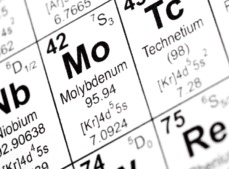Molybdenum (Mo)
 Molybdenum is another interesting mineral with important roles in the growth of plants out of all proportion to the tiny amounts required. It is present in very small amounts in most soils, but is abundant in certain shale types. Its most important role is in enzymes that facilitate plant uptake of nitrogen. Deficiency is rare in the UK, but where it occurs, the symptom is a deformation of the growing leaf known as "whiptail".
Molybdenum is another interesting mineral with important roles in the growth of plants out of all proportion to the tiny amounts required. It is present in very small amounts in most soils, but is abundant in certain shale types. Its most important role is in enzymes that facilitate plant uptake of nitrogen. Deficiency is rare in the UK, but where it occurs, the symptom is a deformation of the growing leaf known as "whiptail". For its role in nitrogen uptake it is very important for optimal yields of cereals, grapes and vegetables, particularly brassicas, but it can be very problematic in grassland. In pastures with poor trace element presence, often with low copper levels, plant uptake of molybdenum can be excessive. This excessive molybdenum combines with the available copper in a cow's rumen to form thiomolybdates; compounds that make the copper unavailable to the animal and cause serious deficiencies in both dairy and beef cattle.
It is therefore a very risky business to put supplementary molybdenum into any land that may be used for grazing or livestock fodder.
